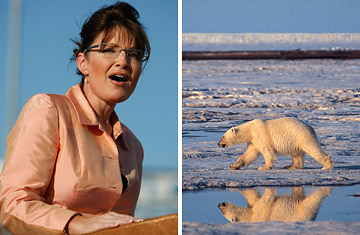
Senator John McCain's reputation as a maverick has taken a beating this campaign season, but on environmental issues he's still zigging when much of the Republican Party zags. While some GOP leaders remain unconvinced that man-made global warming is real, and more doubt that federal cap and trade legislation is necessary to combat it, McCain talks about climate change at every campaign stop and says he supports carbon caps. Though McCain has flip-flopped on offshore drilling for petroleum — he's now a vigorous supporter — he's still against opening up the pristine Arctic National Wildlife Refuge for energy exploration, even though many in the GOP, including President George W. Bush, are for it. Those in favor of drilling in ANWR can now add another prominent supporter to their list: Alaska governor and vice-presidential nominee Sarah Palin.
Though warming is happening faster in Alaska than anywhere else in the U.S. — average temperatures in the country's biggest state have risen 3.6 degrees Fahrenheit over the past 50 years — Palin is on record doubting that human action is the main driver behind climate change. In a recent interview with Newsmax.com Palin noted that warming would affect Alaska "more than any other state, because of our location." But she added, "I'm not one though who would attribute it to being man-made." If Palin is still that ambivalent on climate change, it would put her to the right even of President Bush, who after years of claiming that more research was needed on the issue, now acknowledges the U.S. should reduce man-made carbon emissions to avert dangerous global warming.
More pertinent might be Palin's positions on oil drilling in Alaska, where rich petroleum reserves paid each citizen over $1,600 in dividends in 2007. Though the McCain campaign has made much of Palin's willingness to stand up to the powerful energy industry in Alaska — last year she adjusted the state Petroleum Profits Tax to close loopholes exploited by oil and gas companies — on the whole she's been a staunch supporter of fossil fuels. She opposes strengthening protections for beluga whales in Alaska's Cook Inlet, where oil and gas development has been proposed, and she spent $500 million in state money to encourage the development of a 1,700-mile pipeline that would transport natural gas from Alaska's rich North Shore. When the Department of the Interior in May listed the polar bear as a threatened species due to warming—an action that could interfere with drilling in Alaska's coastal waters, where the polar bears live —Palin sued the Federal Government in response. "Our main concern with Sarah Palin's positions are that they are based on doing what is best for the oil industry, and not what is best for Americans," says David Willett, national press secretary for the Sierra Club.
Palin's support for drilling in ANWR — opening up the refuge was one of her 2006 campaign positions — is particularly galling for environmentalists. The nearly 19 million acre slice of untouched northeastern Alaska has been a symbol of the struggle between energy exploration and the environment since its creation in 1960. ANWR is home to bears, gray wolves, sandhill cranes and a herd of caribou. According to the U.S. Geologic Service, it also may hold 10.3 billion bbl. of "technically recoverable undiscovered oil," which amounts to the largest onshore, unexplored oil deposits in the U.S. If you're going to "drill, drill, drill," as McCain has been saying, ANWR is where you would start.
But environmentalists say that Palin's push to open up ANWR to oil exploration would effectively destroy the refuge. Though only a 1.5 million acre coastal plain within ANWR is thought to contain petroleum, drilling would likely wreak havoc with wildlife well beyond that narrow strip of land. "The impact would be cumulative," says Margaret Williams, Alaska-based director of the World Wildlife Federation's Bering Sea Program. "You'd have road traffic, and flights overhead bringing in equipment. Development of the tundra would come with a very, very large footprint."
Drilling would also have minimal long-term impact on gas prices: a 2004 study by the Energy Information Agency found that the oil in ANWR might cut the cost of a gallon of gas by all of 3.5 cents by 2027. Even if the drilling were flawless, exploration would destroy much of what makes ANWR special. As Peter Matthiessen wrote of the reserve, it is "one of the last places on earth when a human being can kneel down and drink from a wild stream without being measurably more poisoned or polluted than before."
In reality, even a McCain victory is unlikely to make ANWR open for drilling any time soon. A change in federal policy would require an act of Congress, and Democrats have remained united in their opposition to drilling ANWR. A Vice President Sarah Palin wouldn't change that. If gas prices rise again, though, that political calculus could change — in spite of the views of the party's presidential candidate. "When America set aside the Arctic National Wildlife Refuge," McCain has said, "we called it a refuge' for a reason." (See photos of Sarah Palin here.)
